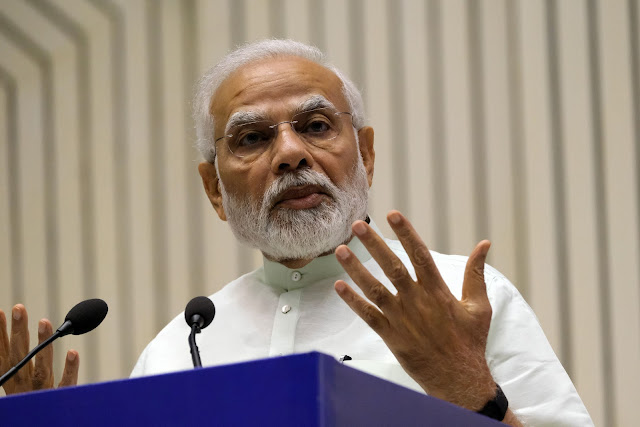PM Narendra Modi claims India has 2,300 registered fintech startups
According to Prime Minister Narendra Modi, India already has 2,300 registered fintech startups, rising from 500 in 2018. The Prime Minister stated at the inauguration of Vanijya Bhawan, “At the time of laying the foundation stone of Vanijya Bhawan, India used to recognize 8,000 startups every year. However, the country now recognises over 15,000 startups yearly.”
 |
| India Prime Minister Narendra Modi |
When asked about the online public procurement platform GeM, the Prime Minister stated that the portal formerly received orders worth Rs 9,000 Crores, but presently handles orders worth over Rs 2.25 Lakh Crores. He further stated that the GeM platform currently has over 45 lakh small entrepreneurs registered.
Previously, the Prime Minister stated that India's digital economy will reach $1 trillion by 2025. He also added that the country forecasts 7.5 percent growth this year, making India the world's fastest-growing major economy. India's digital economy has risen tremendously in recent years as a result of lower internet mobile services, relatively affordable smartphones, and millennials' rising participation in entertainment and social media platforms. The country's consumer digital economy, which was anticipated to be around $85-90 billion in 2020, is expected to grow to $800 billion by 2030 at a CAGR of 25 percent.
The Indian fintech sector, which is expected to be worth $1.3 trillion by 2025, is now limited by the RBI's regulations, which prevent non-bank PPI fintech startups from providing credit to native consumers.
The Reserve Bank of India stated in a recent notification, “The PPI-master direction does not permit loading of PPIs from credit lines. Such practice, if followed, should be stopped immediately. Any non-compliance in this regard may attract penal action under provisions contained in the Payment and Settlement Systems Act, 2007.”
This was a tremendous roadblock for fintech players, particularly digital lending services, whose revenue is primarily derived from credit lines. As a result, fintech startups such as EarlySalary, Jupiter, and KreditBee have now frozen customers' prepaid credit card transactions in order to comply with the central bank's mandate and protect their partner organisations from being penalised.
Furthermore, the country's fintech sector is experiencing a sharp fall in fundraising activity. According to a report, fintech funding dropped 45 percent to $1.77 billion in Q1 2022. The economic slowdown, negative market sentiment, a rise in federal interest rates, and the Russia war are all elements contributing to the fintech sector's decline.
